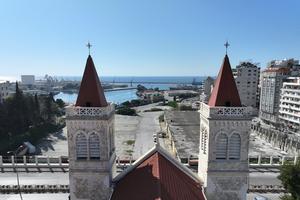‘Hope Is Dying’ in Syria, Nuncio Says
The nuncio said more than 90% of the population is living under the poverty threshold and statistics show that many children are going hungry or are malnourished.

VATICAN CITY — Pope Francis’ representative in Syria has said people are losing hope as the Syrian civil war continues and widespread poverty explodes.
“I’ve seen so many people die, I’ve seen young people die too, now I see hope dying,” Cardinal Mario Zenari told CNA Sept. 2.
“It is clear that hope is there, but it is far away. Sooner or later there will also come a future for Syria but currently it is so complicated, isn’t it?” he said. “And hope is lacking, hope is dying.”
Cardinal Zenari, apostolic nuncio in Syria since 2008, met Pope Francis Sept. 3 with members of AVSI, a nonprofit supporting Project Open Hospitals in Syria.
Pope Francis praised the initiative, which supports free services through three Syrian hospitals and four walk-in clinics, calling it “the ‘creativity of charity,’” a phrase of Saint John Paul II.
“International observers tell us that the crisis in Syria continues to be one of the most serious worldwide, in terms of destruction, growing humanitarian needs, social and economic collapse, and poverty and famine at dire levels,” the Pope said Sept. 3.
“In the face of such immense suffering,” he said, “the Church is called to be a ‘field hospital’ and to heal wounds both physical and spiritual.”
Speaking to CNA a day ahead of the papal meeting, Cardinal Zenari explained that while “fewer bombs are falling,” especially in the north of Syria, another, noiseless, bomb has detonated, that of a poverty crisis.
The nuncio said more than 90% of the population is living under the poverty threshold and statistics show that many children are going hungry or are malnourished.
In his speech Saturday, Pope Francis thanked the group for the gift of an icon of Jesus the Good Samaritan.
“The man in the Gospel parable, beaten, robbed and left half-dead by the side of the road, can serve as another tragic image of Syria, beaten, robbed and abandoned for dead on the roadside,” Francis said.
Yet Syria has not been forgotten or abandoned by Christ, he continued, nor by the many “Good Samaritans” — individuals, associations, and institutions — which have lended a hand.
Cardinal Zenari recalled that “some of these Good Samaritans,” as many as a few hundred according to the United Nations, were killed while working or volunteering in Syria.
“And these are beautiful signs of hope,” he said.
A priest and Franciscan friar belonging to the Custody of the Holy Land told CNA Friday that Syria is in need of people who work with the sick, the hungry, traumatized children, and those suffering from depression because of the civil war.
“So right now we need Good Samaritans in Syria,” Father Fadi Azar said.
Father Azar has been serving in Syria since 2015. For the last three years he has been based in the port city of Latakia, where his parish has grown from 200 to 750 families, he said, due to the influx of Syrians fleeing other parts of the country.
The priest, who was born and raised in Jordan to Palestinian parents, understands the plight of refugees.
Father Azar also helps run one of the walk-in medical clinics supported by Project Open Hospitals.
“Everyday life is becoming more difficult for the people and a lot of them are dying because they cannot afford to buy their medications,” he explained, calling Project Open Hospitals “an intervention of Divine Providence,” and “a miracle.”
“Our work as religious should be only spiritual,” Father Azar said, “but right now we are operating in humanitarian [needs].”
Pope Francis said: “When we think of Syria, there comes to mind the verse of the Book of Lamentations: ‘Vast as the sea is your ruin; who can heal you?’ (2:13). Those words refer to the sufferings of Jerusalem, but they also make us think of the suffering endured by the Syrian people in these twelve years of violent conflict.”
“If,” he said, “we consider the number of the dead and wounded, the destruction of entire quarters and villages, as well as important infrastructures, including healthcare institutions, it is natural to ask: ‘Syria, who can now heal you?’”
- Keywords:
- syria
















